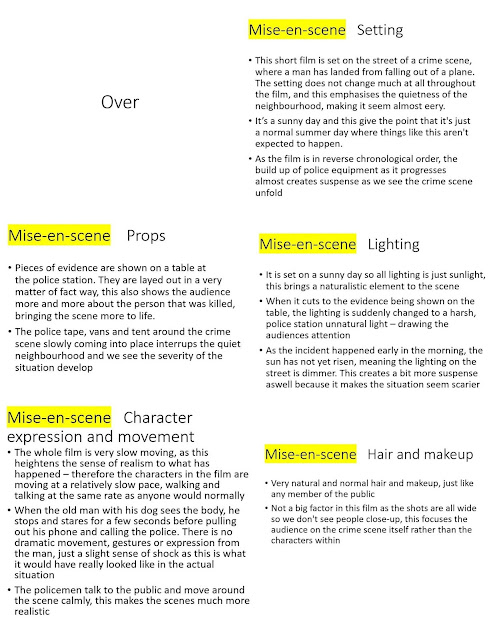Here is a film
Jemima Montague Film Studies
Monday, 3 May 2021
Monday, 28 September 2020
Why are there short films?
Short films are produced for a huge variety of reasons. They can simply exist
just for pure entertainment, however often they are there with other intentions
too. For example, a short film may be produced for educational purposes in
order to enlighten the viewer on a topic that the producer deems important. Or,
creating a short film may be a way of a creator to express themselves through
the art form of film. There are also many other purposes to creating short film:
to create a profit, to gain exposure, to express a political point, or even to get
good grades...
Anyone can make a short film. The great thing about it is that you don't need
expensive and fancy cameras, microphones and equipment - the technology
we have now makes the physical production elements of creating film so much
easier! As well as this, anyone can be in a short film. More often then not, the
people playing the roles in a short film are not Hollywood film stars. As long
as the person in front of the camera is confident enough to do so, the film can
still turn out exactly as intended.
Online video streaming services such as YouTube are the main platform for
the output of short films, as they are so easily accessible and can reach large
audiences. However, for some short film creators (often a little more
experienced), physical events such as film festivals are a great way of
showcasing their work, and gaining recognition.
When film was first invented, they didn't have the access or the technology to
produce films of much length - therefore, most films were short anyway. These
were presented to an audience at a theatre, or even in a gallery.
Anyone with access to the internet and/or film festivals can take part in
watching short films, and there are so many different types/genres to choose
from.
Saturday, 19 September 2020
Research on Existing Student-Made Short Films
'Time' by Ben Robertson
The first film I looked into was 'Time' by A-Level student Ben Robertson. From first watching it, I really enjoyed it. The short film had a clever storyline based on the concept of time and how it follows a man through different stages of his life. We are shown significant points throughout the development of life, with the film starting with a school boy staring at a clock wishing for it to 'tick faster'. The film finishes with the boy now an old man, staring at his clock however he is now wishing for it to 'tick slower'. This gives 'Time' a cyclical structure, and you could apply Todorov's narrative theory of equilibrium to the film - it follows a linear plot line and the end is similar to the beginning, with the new equilibrium being the fact that the man has grown up. The change in the man's perspective on time from start to end allows the audience to reflect and think about how fast life goes.
The protagonist in 'Time' is the man who's life we follow. Not much of his characteristics and personality is revealed, and this is because his life flashes forward and it's as if he is simply a representation of the average person's life. On the other hand, a couple of moments in this film are quite emotional - for example the death of his mother and the moment at the end when he is
old and wishing for time to slow down. This gives the audience a slight sense of sympathy for the character.
In regards to the micro elements of 'Time', I was really impressed by the editing and especially the transitions during the film. In between some of the scenes was a circular transition - the camera would zoom into a circle shaped object before linking it with another circle in the beginning of the next scene. This seems to represent a clock face (which is also shown at the start and end) and it links together the whole theme of the film, which I thought was really clever. There was a lot of camera movement around the man during the scenes, at the level of his height. This gave the effect of framing the moment of his life, giving it significance and representing the importance. During some of the moments of dialogue, Ben Robertson makes use of an over the shoulder shot, and this is so the audience can interpret the situation from the perspective of the man. This keeps his life story the central point of the film.
Friday, 12 June 2020
Set Short Films Analysis
links to the films
over - https://youtu.be/EfXGN0sllA0
the ellington kid - https://youtu.be/-InkUlwrqXs
echo - https://youtu.be/OijjQr6WLfM
the arrival - https://youtu.be/0SWNMjBchC4
slap - https://youtu.be/uKFToZzqyZA
the fly - https://youtu.be/16ymmfya3i8
operator - https://youtu.be/d561hjcaROo
tight jeans - https://youtu.be/BcPBCrUc8YI
Wednesday, 8 April 2020
Thursday, 30 January 2020
Subscribe to:
Comments (Atom)
-
Montage of 100 different people throwing a paper ball to each other https://youtu.be/CGPSnhU9nOk
-
‘Create a short film about a character who is stuck in an awkward situation’ ...





































